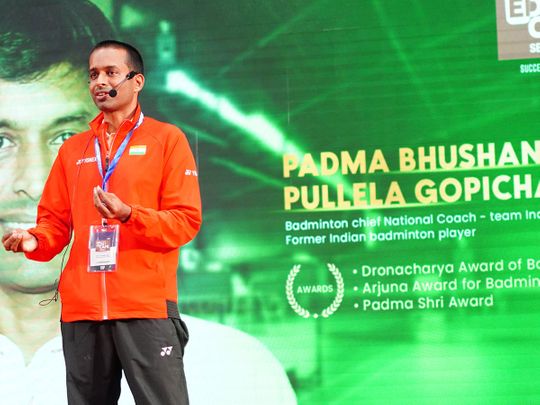
Dubai: Sport teaches you how to handle failure and the process of becoming a champion will help you not just in sport but in life as well is the take away from our interaction with legendary Indian badminton coach Pullela Gopichand.
For those who don’t know who Gopichand is, here is a brief bio. He became the second Indian to win the All England badminton championships in 2001 after Prakash Padukone — the father of Bollywood actor Deepika Padukone. Gopichand started his badminton academy in Hyderabad, which produced many champions like Saina Nehwal, PV Sindhu, Parupalli Kashyap and Srikanth Kidambi, who recently won the silver in the World Championships at Heulva in Spain in 2021.
In recognition of Gopichand’s service to badminton, the Government of India has honoured him with some of the top sports and civilian awards including Arjuna Award, Major Dhyan Chand Khel Ratna Award, Padma Shri, Dhronacharya Award and Padma Bhushan.
Addressing a huge gathering after releasing his book ‘Shuttler’s Flick, Making Every Match Count’ at the Gulf Madhyamam educafe held in Dubai, Gopichand spoke about life lessons that sport teaches you including facing failures and how it is important to daily life, especially for children.
Take loss in your stride
“How many of us have failed when we are children in anything other than sport?,” the 39-year-old champion began his talk with a question. “We need to play sport, not because you will get a career like mine, but it’s because sport teaches you about losing. In class how many of us fail? Very [few], but everyone who plays sport fails someday or the other. Life is [about] getting out of failures, and nobody teaches you better than sport,” Gopichand extolled the values of sport.
The champion coach went on to narrate how a simple game in the neighbourhood will improve communication skills among children apart from making them realise that one has to make sacrifices to be part of a team while also teaching leadership qualities.
“If 10 kids go out and play, they get together and decide what sport to play. They discuss to decide on a sport and try to impress upon others. Communication improves. One of them in that group will become a leader so somebody learns leadership, somebody learns to be part of the team.
Teamwork is important
“In life leadership and being part of the team are hugely valuable. Sometimes, you want to play one sport while all the others want to play a different sport, and you join them. It also gives you the understanding that all the decisions will not go the way we wanted it to go, but still we have to be part of the team,” he went on narrating the importance of sport to an audience that numbered in the hundreds.
Gopichand, despite excelling in singles badminton, spoke about a team sport — football — and the life lessons that one learns from that.
“If you play football, one is playing and sees 10 others trying to stop him, meaning he sees threats from different people. He sees his own people, knows his strengths and knows his partners’ strengths. So he passes the ball to another for a common goal. That element is what exactly life is all about. Perceiving threats and making decisions based on the common good of the team.”
He also spoke about how sport strengthens some core values such as discipline, dedication, hardwork and sacrifice.
Trust the process
“The process makes you so strong that your potential becomes very big and allows you to achieve anything in life. You will try to reach the finish line even if all your resources are finished. So, in short you will not leave anything unfinished. If you try to be selfish in a team game, you very soon will realise that nobody wants you on their team. So you learn not to be selfish without any lecture.
“The process of trying to become a champion is probably more beneficial than actually becoming a champion in sport.”
To a question from the audience on one piece of advice that Gopichand would want to give it to the current young generation, the reply came back like a reverse flick from his dreaded racquet.
“The current generation dream big and they are a confident lot now. But a word of caution to the current generation: Be careful. Don’t be busy doing nothing,” he said about the pitfalls of indulging in social media for too long.








